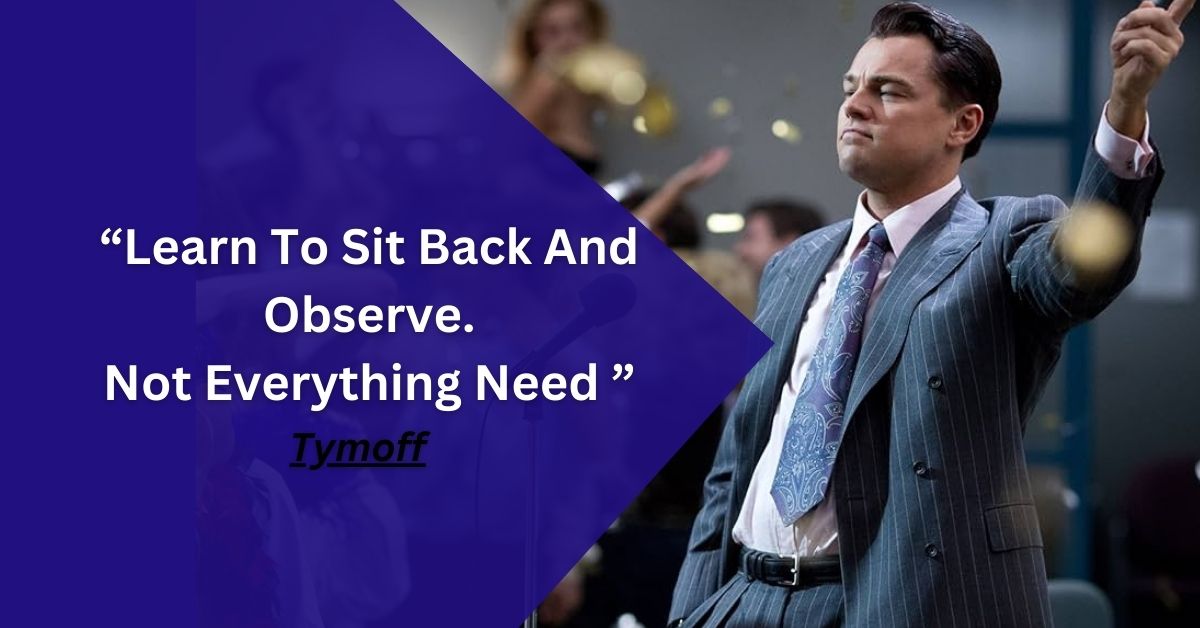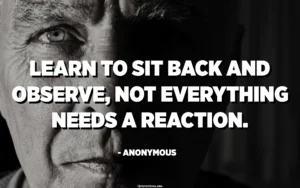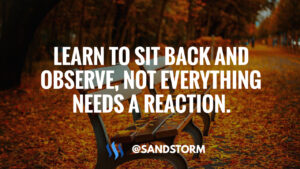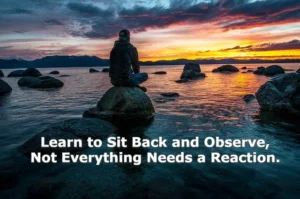Uncategorized
learn to sit back and observe. not everything need – tymof
Published
12 months agoon
By
Admin
In today’s fast-paced world, the pressure to constantly be active and productive can feel overwhelming. learn to sit back and observe. not everything need – tymof We’re bombarded with messages that tell us to hustle, grind, and always be on the go. However, amidst this frenzy, there’s a valuable lesson to be learned: the art of sitting back and observing. In a culture that glorifies busyness, learning to take a step back and simply observe can be a revolutionary act of self-care and mindfulness.
Why is it Important to Sit Back and Observe?
- Gain Perspective: When you’re constantly caught up in the whirlwind of activity, it’s easy to lose sight of the bigger picture. Taking time to sit back and observe allows you to gain perspective on your life, your goals, and your priorities. It helps you see things from a different angle and make more informed decisions.
- Reduce Stress: The constant pressure to be productive can take a toll on your mental and physical health. By learning to sit back and observe, you give yourself permission to relax and unwind. This can significantly reduce stress levels and promote overall well-being.
- Enhance Creativity: Creativity thrives in moments of stillness and contemplation. When you allow yourself the time and space to sit back and observe, you open the door to new ideas and insights. It’s in these moments of quiet reflection that some of the most innovative thoughts are born.
Must Read=build insane triceps by doing skull crushers – laz – tymoff
- Improve Relationships: In our fast-paced lives, it’s easy to neglect the people around us. By taking the time to sit back and observe, you can strengthen your relationships by being more present and attentive. You’ll also gain a deeper understanding of others by truly listening and empathizing.
FAQs:
1. Isn’t sitting back and observing just another form of laziness?
No, sitting back and observing is not about being lazy. It’s about being intentional with your time and energy. Just as a photographer steps back to get a better shot, or a scientist observes before drawing conclusions, sitting back and observing allows you to approach life with greater clarity and purpose.

2. How can I incorporate sitting back and observing into my busy schedule?
It doesn’t have to be a major time commitment. Even just a few minutes of quiet reflection each day can make a difference. Try incorporating mindfulness practices such as meditation or journaling into your routine. You can also make a conscious effort to take short breaks throughout the day to simply pause and observe your surroundings.
3. What if I feel guilty for taking time to sit back and observe?
It’s normal to feel guilty at first, especially if you’re accustomed to constantly being in motion. However, it’s important to remember that taking care of your mental and emotional well-being is not selfish—it’s necessary. By prioritizing self-care and mindfulness, you’ll actually be better equipped to show up fully for yourself and others.
4. Won’t I fall behind if I’m not constantly hustling?
Contrary to popular belief, constantly hustling is not the key to success. In fact, burning yourself out can ultimately hinder your progress. By taking the time to sit back and observe, you’ll actually be more productive in the long run. You’ll make better decisions, avoid costly mistakes, and have the clarity and energy to pursue what truly matters to you.

Conclusion:
In a world that values speed and productivity above all else, learning to sit back and observe may seem counterintuitive. However, it’s a powerful practice that can bring about profound changes in your life. By taking the time to pause, reflect, and truly observe, you’ll gain clarity, reduce stress, and cultivate a deeper sense of presence and purpose.
So, the next time you feel the urge to rush forward, remember the wisdom of sitting back and observing. Not everything needs your time—sometimes, the most valuable thing you can do is simply be.
Remember, it’s not about doing nothing; it’s about doing nothing with purpose.
This article emphasizes the importance of slowing down and observing in a fast-paced world, providing reasons why it’s crucial and addressing common questions or concerns about this practice. Let me know if you need further adjustments or additional information.
You may like

Efficient ACA Compliance Management with ACA-Track

Key Software Systems: Future-Proofing Courier Operations with Technology

Refrigerated Trailers: Benefits and Uses

100 Dynamic Duos: Legendary Pairings That Transcend Time
ARK: Survival Evolved Game Icons and Banners

cute:i1cdycptg50= drawings

Understanding New York Sports Club Membership: What It Offers and What Affects the Cost

Safety Tips for Compressed Air Dryers

drawing:23vyczbybxu= billie eilish

drawing:056aoyw74ce= rick and morty

How can online food delivery sales increase and attract the maximum number of customers in 2023?

MEP BIM: Revolutionizing Building Infrastructure Design

Revolutionizing Industries with ChatGPT

Resolving the Israeli-Palestinian Conflict: A Comprehensive Analysis

Skillful Passion: Wisconsin’s Dominant Volleyball Team

Virtual Reality Rental: A Futuristic Experience

Unlocking the Potential of cryptonewzhub.com Internet

Negin Behazin vs Dignity Health: Comprehensive Comparison

Unraveling the Mystery: Robert Card’s Tragic Passing

iPhone 14 Pro Max: Unveiling the Next Level Innovation

Efficient ACA Compliance Management with ACA-Track

Key Software Systems: Future-Proofing Courier Operations with Technology

Refrigerated Trailers: Benefits and Uses

100 Dynamic Duos: Legendary Pairings That Transcend Time
ARK: Survival Evolved Game Icons and Banners

cute:i1cdycptg50= drawings

Understanding New York Sports Club Membership: What It Offers and What Affects the Cost

Safety Tips for Compressed Air Dryers

drawing:23vyczbybxu= billie eilish

